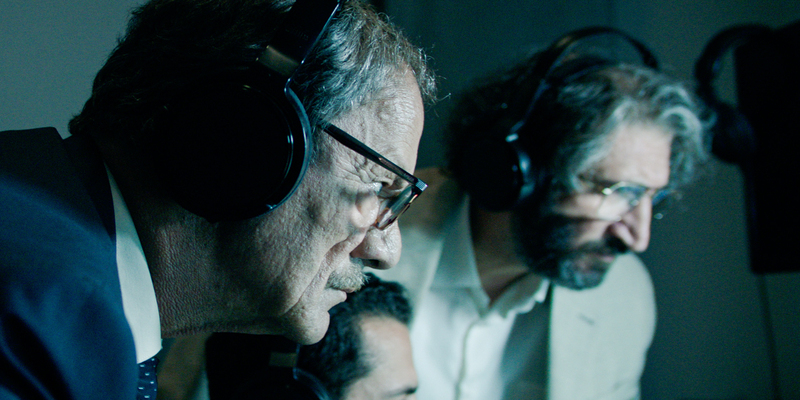
Review by
Benjamin Poole
Directed by: Tarik Saleh
Starring: Tawfeek Barhom, Fares Fares, Mehdi Debhi, Mohammad Bakri, Ramzi
Choukair

Developing his syntactic approach for the evaluation of artistic content
as "an iridescent exchange carried on by multiple voices, on different
wavelengths," Roland Barthes identified five semiotic elements (bear with
me) which the French essayist argued were inherent to all texts: codes
which constructed the fundamental narrative structure of the story. One
such component was the proairetic code, which referred to action within
the plot, principally causal sequencing. For example, in the specific
moment, if someone knocks a door in a movie scene (the code) then the door
can either be answered or the knock ignored: either way, one action has
led to another. In the overview, the proairetic code defines the falling
domino progression which creates A to B plot structure and subsequent
narrative satisfaction. Originally coined as a part of a wider campaign to
dismantle the myths of mass culture, Barthes' five codes nonetheless serve
as a handy primer to the nuts and bolts of storytelling. The problem,
however, with Barthes (and the rest of the Gauloise toting French lads,
like Baudrillard) is that by exclusive focus on the mechanics of
narrative, the structuralist approach forgoes how audiences create
subjective meaning from art, and the enduring emotional resonance of
story. It isn't just the ingredients, but how you use them, too.

Case in point is Cairo Conspiracy, writer/director Tarik Saleh's low key political thriller. The
premise certainly intrigues: Adam (Tawfeek Barhom), the humble son
of a fisherman, is offered a place at the prestigious Al-Alzhar university
which, the opening intertitle informs us, was created in 972 AD as the
"centre of Islamic learning." However, "over centuries" the crawl
continues, certain "rulers of Egypt have tried to control" the school.
Coinciding with the start of term at Al-Alzhar, the institution's Great
Imam is dying, and the government deign to select the school's next head,
who will preferably be in their pocket. Cue poor Adam, freshly escaped
from being group punished for his brother smoking by his nutcase piscator
dad cracking a belt across his palm, being used as what can only be
described as a pawn between two conniving factions who crave dominance
over Al-Alzhar for reasons. That's not to be glib: the brutal punishment
of Adam and his two brothers is pointedly prolonged, filmed in unflinching
medium compositions which focus Deliverance style on the
pain of the recipients, the better to establish
Cairo Conspiracy's abiding themes of accepted patriarchal dominance, and the violent
means of enforcing it.

It's a shame, then, that Cairo Conspiracy doesn't go on to
match the evocative imagery and arresting pace of its opening. Instead,
what is proffered is a by numbers exemplification of the proairetic
principle, as Adam is manipulated by chiefly his handler Colonel Ibrahim
(Fares Fares), who blackmails him into service by threatening his
family, and the concurrent ramifications of the school's resistance to
interference. The film simply moves along from one moment to the next,
shorn of suspense or dramatic effect. Adam's roommate is unceremoniously
bumped off more or less in front of him, murdered to death via a shove off
a tall building, and neither Adam nor anyone else is all that arsed. The
death simply performs as a transfer to subsequent proceedings, viz. Adam
being fingered for the next "mole."

The performances are fine. Fares does imbue Ibrahim's go-between with his
residual charisma, but it is difficult to engage with the compromised
Adam, since, really, he is simply shifted by the demands of the plot,
barely reacting either way. Such is Cairo Conspiracy's fealty to functional storytelling shorn of emotive resonance and
audience-positioning suspense that I began to wonder if the film was a
representation of actual events, due to the steadfastly sober recount
which seemed to consciously avoid the sort of intriguing storytelling that
could lead to accusations of sensationalism. It isn't, although
Cairo Conspiracy was considered such a hot potato by the
Egyptian authorities that it has been banned (although set in Cairo, the
film wasn't made there, with a flatly depicted Istanbul standing in for
the city). I can't see the fuss myself.
Cairo Conspiracy works as a narrative, but it doesn't affect
as one.

Cairo Conspiracy is on UK/ROI
VOD now.

